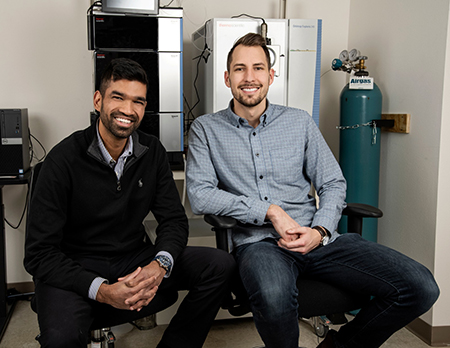Immuto Scientific is opening new frontiers in the fight against cancer by developing precision biotherapeutics that target highly cancer-specific surface protein conformations. Their ultimate goal is to make cancer curable.
Immuto Scientific was one of the companies supported by the National Institutes of Health (NIH) SEED program that was chosen to present on the NIH Innovation Zone Stage at the 2024 BIO International Convention.
Bio.News interviewed Immuto Scientific CEO Faraz A. Choudhury, Ph.D, about the ongoing work of the Wisconsin-based biotech firm.
Q: What sets Immuto Scientific apart from other biotechnology firms tackling cancer? Please elaborate on your approach to identifying and drugging disease-specific targets.

As we all know, drug discovery has a high failure rate, and oftentimes this is due to poor target selection. Most targets exist in healthy tissues causing “on target, off tumor” toxicity, which leads to failures in clinical trials. At Immuto, we are tackling cancer with a new approach. We are drugging a new class of targets that are highly cancer-specific surface protein conformations (SPC targets).
These targets exhibit unique structures in tumor cells, exposing tumor-specific epitopes that can be targeted with antibodies for ADC (antibody-drug-conjugate), CAR-T, and bispecific approaches. We have the unique ability to identify these targets—which go undetected by traditional techniques—directly from patient samples. We leverage our leading-edge platform that combines advanced techniques in structural mass spectrometry and computational modeling to derive unparalleled insights into protein and dynamics within living cells at a very large scale. We are developing a differentiated pipeline of precision biotherapeutics against these novel targets that are highly precise and effective for the patients.
Q: Could you discuss your PLIMB technology, and explain how it is different from other offerings in the marketplace?
PLIMB is one of our proprietary platforms that enables empirical characterization of protein structures directly in living cells. PLIMB (which stands for Plasma Induced Modification of Biomolecules) generates a plasma to create free radicals to label the surface exposed amino acids of proteins, which are detected and quantified by mass spectrometry to reveal important structural insights. The platform is fully automated and multiplexed, which allows high throughput analysis of a large number of proteins.
What sets us apart is the unique ability to analyze proteins in their native cellular environment, which is critical for understanding the real biology of proteins that are an important drug target. Conventional methods separate the proteins from their native cellular environment and are also time consuming—taking several months or even years to analyze a single protein. With PLIMB, we can analyze hundreds of proteins at a time and directly in live cells, which allows us to identify new drug targets directly from patient samples and rationally design antibodies that target highly specific epitopes.
Q: Going forward, what is your hope not only for Immuto Scientific but for the industry more broadly over the next few years when it comes to confronting cancer and improving patient outcomes?
Our mission at Immuto is to innovate and accelerate the discovery of new cancer treatments that significantly improve patient outcomes. Our vision is to lead the industry in developing therapies that transform cancer from a life-threatening disease to a manageable condition, ultimately striving for a world where cancer is curable.

Q: Your company is based in “the heartland,” Wisconsin; how has this impacted your view of the biotech industry and innovation landscape?
Being based in Wisconsin provides us with a unique perspective on the biotech industry and the broader innovation landscape. Wisconsin boasts a rich history of scientific research and a strong network of academic institutions, including the University of Wisconsin-Madison, which is a hub for groundbreaking research and development in the life sciences. This environment fosters collaboration and innovation, allowing us to tap into a diverse pool of talent and resources.
Moreover, the supportive local ecosystem, combined with a lower cost of living compared to coastal biotech hubs, enables us to allocate more resources directly to research and development. This setting encourages a focus on long-term goals and sustainability, which is essential in the field of drug discovery, where development timelines can be extensive.
Q: After completing your postdoctoral training, you spent several years as a Research Scientist in the Department of Biochemistry at the University of Wisconsin-Madison. How important is the bridge between academia and industry in the biotech sector? What more can and should be done to foster greater collaboration and dialogue between the two?
The bridge between academia and industry is absolutely critical in the biotech sector. My time as a Research Scientist at the University of Wisconsin-Madison reinforced the immense value of this connection.
Academic institutions are hotbeds of fundamental research and innovation, often pioneering new scientific discoveries that can serve as the foundation for future therapies. Industry, on the other hand, plays a crucial role in translating these discoveries into practical, marketable treatments that can benefit patients. Establishing more collaborative research initiatives that involve both academic researchers and industry professionals can help bridge the gap and accelerate the development of innovative treatments for patients in need.
Learn more about the NIH Small business Education and Entrepreneurial Development (SEED) funding at seed.nih.gov.



